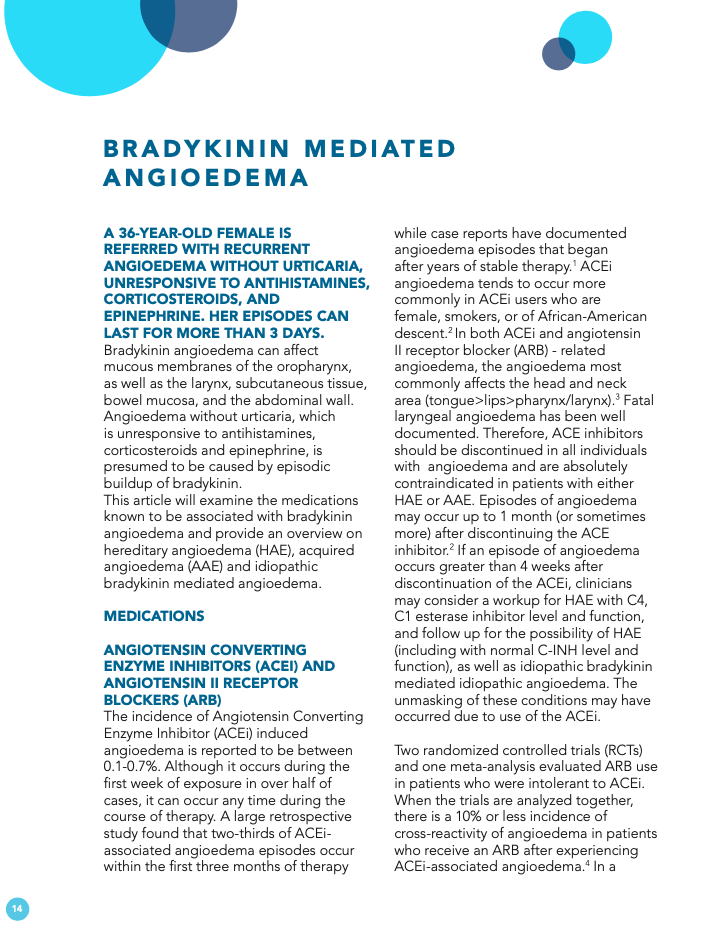Bradykinin Mediated Angioedema
DOI:
https://doi.org/10.58931/cait.2021.1110Abstract
A 36-year-old female is referred with recurrent angioedema without urticaria, unresponsive to antihistamines, corticosteroids, and epinephrine. Her episodes can last for more than 3 days. Bradykinin angioedema can affect mucous membranes of the oropharynx, as well as the larynx, subcutaneous tissue, bowel mucosa, and the abdominal wall. Angioedema without urticaria, which is unresponsive to antihistamines, corticosteroids and epinephrine, is presumed to be caused by episodic buildup of bradykinin. This article will examine the medications known to be associated with bradykinin angioedema and provide an overview on hereditary angioedema (HAE), acquired angioedema (AAE) and idiopathic bradykinin mediated angioedema.
References
Banerji A, Blumenthal KG, Lai KH, Zhou L. Epidemiology of ACE Inhibitor Angioedema Utilizing a Large Electronic Health Record. J Allergy Clin Immunol Pract. 2017 May-Jun;5(3):744-749. doi:10.1016/j.jaip.2017.02.018
Kanani A, Betschel SD, Warrington R. Urticaria and angioedema. Allergy Asthma Clin Immunol. 2018 Sep 12;14(Suppl 2):59. doi:10.1186/s13223-018-0288-z
Bas M, Greve J, Strassen U, Khosravani F, et al. Angioedema induced by cardiovascular drugs: new players join old friends. Allergy. 2015 Oct; 70(10):1196-200. doi:10.1111/all.12680
Beavers CJ, Dunn SP, Macaulay TE. The role of angiotensin receptor blockers in patients with angiotensin-converting enzyme inhibitor-induced angioedema. Ann Pharmacother. 2011 Apr;45(4):520-4. doi:10.1345/aph.1P630
Chapman N, Dixon F, Gupta AK, Incidence of angioedema in randomised controlled trials of angiotensin receptor blockers: a meta-analysis, Eur. Heart J 2013 Aug;34(1)(1):1829
Baş M, Greve J, Stelter K, Havel M, Strassen U, Rotter N, et al. A randomized trial of icatibant in ACE-inhibitor-induced angioedema. N Engl J Med. 2015 Jan 29;372(5):418-25. doi:10.1056/NEJMoa1312524
Straka BT, Ramirez CE, Byrd JB, Stone E, Woodard-Grice A, Nian H, et al. Effect of Bradykinin Receptor Antagonism on ACE Inhibitor-Associated Angioedema. J Allergy Clin Immunol. 2017 Jul;140(1):242-248.e2. doi:10.1016/j.jaci.2016.09.051
Jeon J, Lee YJ, Lee SK. Effect of Icatibant on Angiotensin-converting Enzyme Inhibitor-induced Angioedema: A Meta-analysis of Randomized Controlled Trials. J Clin Pharm Ther. 2019 Oct;44(5):685-692. doi:10.1111/jcpt.12997
Greve J, Bas M, Hoffmann TK, Schuler PJ, Weller P, Kojda G, Strassen U. Effect of C1-Esterase-inhibitor in angiotensin-converting enzyme inhibitor-induced angioedema. Laryngoscope. 2015 Jun;125(6):E198-202. doi:10.1002/lary.25113
Brown NJ, Byiers S, Carr D, Maldonado M, Warner BA. Dipeptidyl peptidase-IV inhibitor use associated with increased risk of ACE inhibitor-associated angioedema. Hypertension. 2009 Sep;54(3):516-23. doi:10.1161/HYPERTENSIONAHA.109.13419
Scott SI, Andersen MF, Aagaard L, et al. Dipeptidyl Peptidase-4 Inhibitor Induced Angioedema – An Overlooked Adverse Drug Reaction? Curr Diabetes Rev. 2018;14(4):327-333. doi:10.2174/1573399813666170214113856
Perza M, Koczirka S, Nomura J. C1 Esterase Inhibitor for Ace-Inhibitor Angioedema: A Case Series and Literature Review. J Emerg Med. 2020 Mar;58(3):e121-e127. doi:10.1016/j.jemermed.2019.10.031
Hudey SN, Westermann-Clark E, Lockey RF. Cardiovascular and diabetic medications that cause bradykinin-mediated angioedema. J Allergy Clin Immunol Pract. 2017 May-Jun;5(3):610-615. doi:10.1016/j.jaip.2017.03.017
Hill MD, Lye T, Moss H, Barber PA, Demchuk AM, et al. Hemi-orolingual angioedema and ACE inhibition after alteplase treatment of stroke. Neurology. 2003 May 13;60(9):1525-7. doi:10.1212/01.wnl.0000058840.66596.1a
Agostoni A, Aygören-Pürsün E, Binkley KE, Blanch A, Bork K, Bouillet L, et al. Hereditary and acquired angioedema: problems and progress: proceedings of the third C1 esterase inhibitor defciency workshop and beyond. J Allergy Clin Immunol. 2004;114(3):S51-131. doi:10.1016/j.jaci.2004.06.047
Zilberberg MD, Jacobsen T, Tillotson G. The burden of hospitalizations and emergency department visits with hereditary angioedema and angioedema in the United States, 2007. Allergy Asthma Proc. 2010 Nov-Dec;31(6):511-9. doi:10.2500/aap.2010.31.3403
Bowen T, Cicardi M, Farkas H, Bork K, Longhurst HJ, Zuraw B, et al. 2010 International consensus algorithm for the diagnosis, therapy and management of hereditary angioedema. Allergy Asthma Clin Immunol. 2010;6(1):24. doi:10.1186/1710-1492-6-24
Betschel S, Badiou J, Binkley K, Borici-Mazi R, Hebert J, Kanani A, et al. The International/Canadian Hereditary Angioedema Guideline. Allergy Asthma Clin Immunol 2019 Nov;15:72. doi:10.1186/s13223-019-0376-8
Bork K, Wulf K, Steinmüller-Magin L, Brænne I, Staubach-Renz P, Witzke G, et al. Hereditary angioedema with a mutation in the plasminogen gene. Allergy. 2018;73(2):442–50. doi:10.1111/all.13270
Bork K, Wulff K, Witzke G, Hardt J. Treatment for hereditary angioedema with normal C1-INH and specific mutations in the F12 gene (HAE-FXII). Allergy. 2017;72(2):320–4. doi:10.1111/all.13076
Deroux A, Boccon-Gibod I, Fain O, Pralong P, Ollivier Y, Pagnier A, et al. Hereditary angioedema with normal C1 inhibitor and factor XII mutation: a series of 57 patients from the French National Center of Reference for Angioedema: type III hereditary angioedema. Clin Exp Immunol. 2016;185(3):332–7. doi:10.1111/cei.12820
Veronez CL, Moreno AS, Constantino-Silva RN, Maia LSM, Ferriani MPL, Castro FFM, et al. Hereditary angioedema with normal C1 inhibitor and F12 mutations in 42 Brazilian families. J Allergy Clin Immunol Pract. 2018;6(4):1209.e8–1216.e8. doi:10.1016/j.jaip.2017.09.025
González-Quevedo T, Larco J, Marcos C, Guilarte M, Baeza M, Cimbollek S, et al. Management of pregnancy and delivery in patients with hereditary angioedema due to C1 inhibitor deficiency. J Investig Allergol Clin Immunol. 2016;26(3):16-7. doi:10.18176/jiaci.0037
Schneider L, Hurewitz D, Wasserman R, Obtulowicz K, Machnig T, Moldovan D, et al. C1-INH concentrate for treatment of acute hereditary angioedema: a pediatric cohort from the I.M.P.A.C.T. studies. Pediatr Allergy Immunol. 2013 Feb;24(1):54–60. doi:10.1111/pai.12024
Cicardi M, Zanichelli A. Acquired angioedema. Allergy Asthma Clin Immunol. 2010 Jul;6(1):14. doi:10.1186/1710-1492-6-14
Cicardi M, Bergamaschini L, Zingale LC, Gioffré D, Agostoni A. Idiopathic nonhistaminergic angioedema. Am J Med. 1999 Jun;106(6):650-4. doi:10.1016/s0002-9343(99)00123-0
Du-Thanh A, Raison-Peyron N, Drouet C, Guillot B. Efficacy of tranexamic acid in sporadic idiopathic bradykinin angioedema. Allergy. 2010 Jun 1;65(6):793-5. doi:10.1111/j.1398-9995.2009.02234.x
Shroba J, Hanson J, Portnoy J. Current treatment options for idiopathic angioedema. Ann Allergy Asthma Immunol. 2015 Nov;115(5):429-33. doi:10.1016/j.anai.2015.07.023
Lepelley M, Bernardeau C, Defendi F, et al. Update on bradykinin-mediated angioedema in 2020. Therapie. 2020 Apr;75(2):195-205. doi:10.1016/j.therap.2020.02.011

